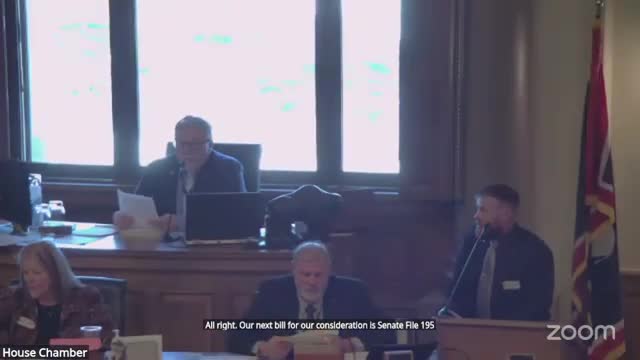House committee advances small-business emergency bridge loan program to speed post-disaster recovery
Get AI-powered insights, summaries, and transcripts
Subscribe
Summary
The Committee of the Whole reported Senate File 195 do pass after lawmakers approved standing committee amendments that broadened eligibility from agricultural producers to all Wyoming businesses affected by a declared natural disaster and placed the appropriation in a state investment account.
The Committee of the Whole reported Senate File 195 do pass after lawmakers approved standing committee amendments that broadened eligibility from agricultural producers to all Wyoming businesses affected by a declared natural disaster and placed the appropriation in a state investment account.
Senate File 195 would create a Small Business Emergency Bridge Loan Program in the Office of State Lands and Investments (OSLI) that becomes available when the governor declares a natural disaster in an affected area. The program is designed to get short-term capital into the hands of Wyoming businesses to avoid operational disruption during recovery, using voluntary donations to a dedicated fund to offset some borrower costs.
Under the bill’s terms discussed on the floor, a qualifying business must have been operating in Wyoming at the time of the disaster and be at least 50% owned by the applicant; lenders will vet applications for creditworthiness and collateral. Loans may be secured with insurance proceeds or other business assets; the maximum loan amount is $750,000 per business, and repayment must occur within three years. The bill establishes a 2% origination fee to compensate participating financial institutions for processing (the applicant is required to pay half of that fee), and the statutory language contemplates a mechanism for donated funds to reduce the borrower's interest costs on a pro rata basis. The program includes an annual reporting requirement by OSLI and the Joint Agriculture Committee (JAC). An appropriation for the fund appears in the engrossed bill; during debate members noted a discrepancy between the fiscal note (which listed $50,000,000) and the bill's appropriation as passed in the other chamber (shown as $25,000,000 on the enrolled text).
Supporters said the measure gives businesses rapid access to capital after fires, floods or infrastructure failure without turning to grants. Representative Heiner moved that the Committee of the Whole report Senate File 195 do pass and described the bill as a "hand up, not a handout," emphasizing lender involvement and fast processing: lenders review and forward complete applications to OSLI and OSLI has five days to disperse funds once the application is recommended. Representative Connolly, who has experience in emergency management, supported the bill and praised the donation option for simplifying charitable giving in a disaster. Representative Storer asked about fiscal details and repayment/default procedures; the sponsor explained that lending institutions are expected to vet collateral and that the program’s structure relies on that vetting to limit state exposure. The committee adopted two standing committee amendments: one opened eligibility from ag-only to all impacted businesses and another placed the appropriation into the state’s investment account (LISRA) so the funds can remain invested until needed.
Formal votes recorded in the transcript: standing committee amendment number 1 was adopted; standing committee amendment number 2 (moving the appropriation into the LISRA/subaccount) was adopted; the Committee of the Whole reported Senate File 195 do pass and the bill was recorded as passed by the Committee of the Whole.
Key program provisions noted in debate: - Administrator: Office of State Lands and Investments (OSLI) will implement rules, accept applications and disperse repayments. - Eligibility: business must have been operating in the disaster area at time of disaster; at least 50% owned by applicant; certain categories (loan packaging, short-term rentals, multi-level sales, gambling, lending activities or activities violating law) are excluded. - Loan terms: up to $750,000; maximum repayment period three years; loans may be secured by insurance proceeds or business assets; lenders perform credit/collateral review; 2% origination fee shared between lenders, applicant and fund. - Funding: appropriation shown in engrossed bill; debate noted the fiscal note initially listed $50 million while the engrossed bill shows $25 million; funds can accept donations and will report annually.
Next steps: The Committee of the Whole forwarded Senate File 195 with adopted amendments for further House consideration.
Ending: Supporters framed the program as a rapid-response financing option to preserve businesses and jobs after disasters; lawmakers pressed for clarity on fiscal assumptions and the role of lenders in limiting state exposure.
